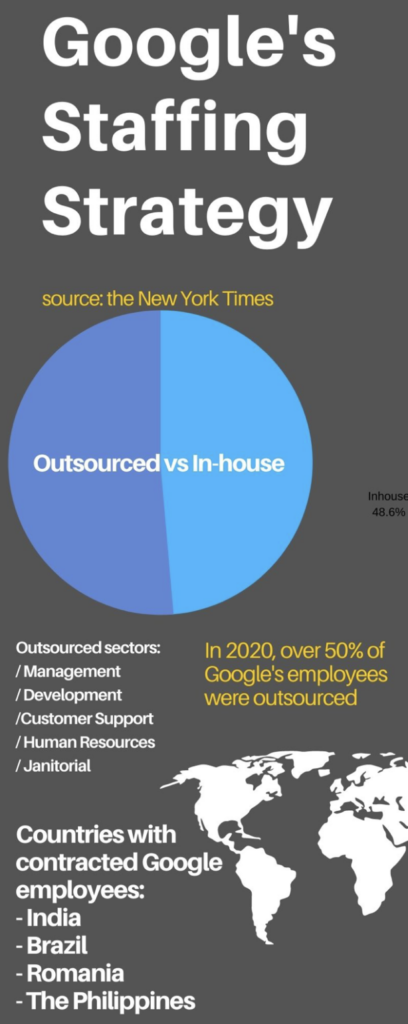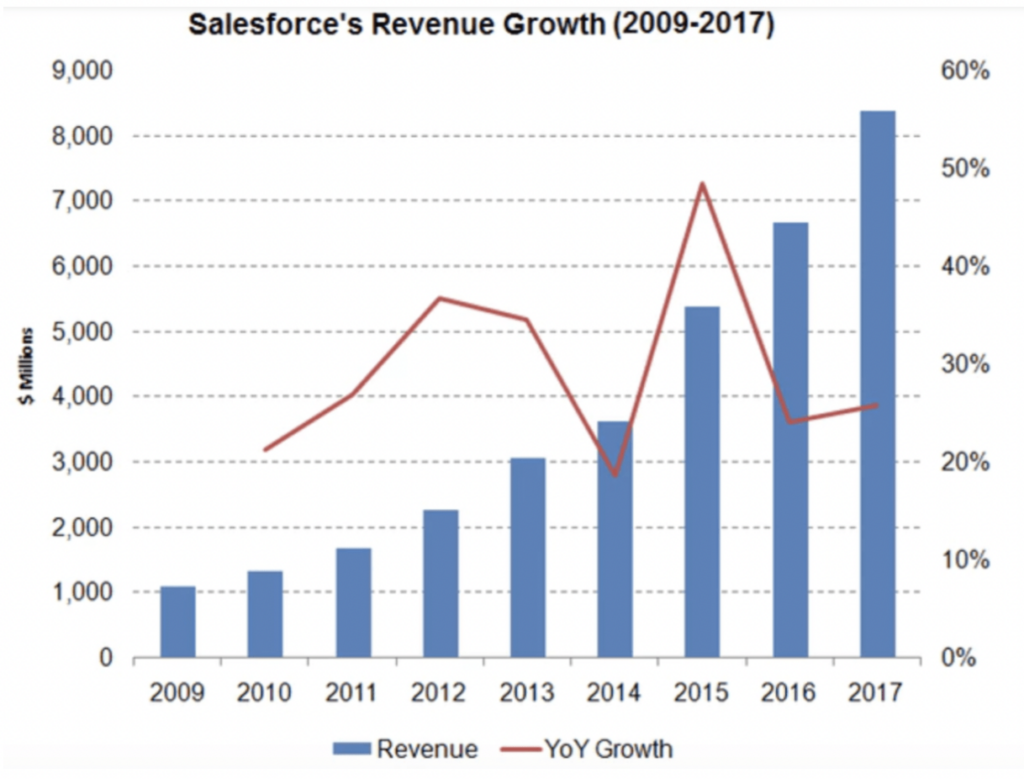
What do Google, HubSpot, Amazon, Apple, Alibaba and Facebook have in common? There are probably lots the owners and founders of these companies have in common with each other, including the expected amount of tenacity, confidence, smarts and luck.
But what we want to know is what they did differently that got them out of their first little start-up garage and onto their billion-dollar bandwagon.
The founders of these businesses have been interviewed countless times about the reasons for their success.
As people who already run businesses, we decided that we want to know the specifics. It’s not about how much sleep they get, what exercise they do, how often they do it or which school they went to. We are talking strategy, tactics and business acumen. We got to the specifics and we found the big 6 that all these ‘Big Tech’ companies have in common.
1. Expedite expansion by outsourcing
Taking a tech team international is no small undertaking. It costs a lot before it brings a return, but when successful, financial benefits are insurmountable.
During the initial stages of expansion, it’s important that seeding into new country markets is done in an impactful and cost-effective way.
Outsourcing is a necessary resource for taking these new risks. Using Employer of Record Services allows companies to test the waters without going through the time and cost consuming bureaucracies of registering your business in a foreign land.
As your company grows, your demand for new employees needs to also be fulfilled in a cost-effective way. As such, outsourcing will continue to be a valuable cost-saving asset.
Case study – Google’s army of contractors

Recent reports have shown that over 50% of Google’s employees are actually outsourced.
Over 130,000 of Google employees are contractors that are managed and paid through staffing and Employer of Record agencies such as Adecco, Accenture and Cognizant.
A portion of these contractors work remotely from the Philippines and India. The remaining 123,000 employees work directly for Google.
The Google outsourcing strategy uses contractors from staffing agencies to fill gaps in talent for specialised projects.
Contractors are also hired to fill in for permanent employees who are away on annual and maternity leave. Google also delegates a large portion of their workforce to staffing agencies just to take a load off managing general operations themselves.

In addition to the operational perks of using staffing agencies, Google also benefits by not having to pay contractors as much as their permanent employees. Health insurance and other requirements for permanent employees are taken care of by the staffing agency or by the contractors themselves.
“In 2018, the number of Google’s contractors surpassed the number of direct employees” Bloomberg
The close partnership that Google has with their staffing agencies also means less training is required for new contractors. In addition, flexible contracts with each temporary employee give Google the ability to make quick decisions based on their own imminent needs.
Specialised staffing agencies source talent from countries that have high standards of education and thus a large pool of talent. Countries that fit the bill include the Philippines, Indonesia and Vietnam.
The Philippines and Indonesia in particular have a large English- speaking workforce with higher education qualifications.
Companies based in countries such as the UK, the US, Australia, Singapore can staff a large percentage of their workforce at a fraction of the cost. As an example, the typical salary for a customer service representative in the Philippines is about USD500 a month while in Australia, the same employee would cost USD4000 a month.
2. Truly understand the importance of Smart Marketing.
Many small businesses make the mistake of investing in marketing as an afterthought, and when times get tough, cuts to the marketing department come first.
Many business owners and CEO’s do this for a few key reasons. The first is that they think anyone can do marketing. They think this because they don’t really know what marketing entails. A lack of understanding in this area often leads to hiring the wrong people to perform an important job and not knowing how to harness the full capabilities of marketing data.
Done right, marketing isn’t just a department that pushes ads and blogs out. A good marketing manager will improve a business’s ability to retain customers, legally acquire new customers that have a higher lifetime value, reduce the amount of time the sales team spends on the buying cycle, shorten the amount of time it takes for people to buy into your product and the list of cost saving and profit-making benefits go on. It’s no wonder 17% of FTSE 100 and 42% of B2B business CEOs started out in marketing.
Your marketing personnel are responsible for determining your buyer’s journey and the way your brand is positioned in your market and in your industry. When this is properly established, your marketing team can acquire the data and execute strategies that pave the way to greater profit.
Good marketers will also understand personal data compliance and how to increase awareness of your business in a new market without breaking laws. With GDPR and data protection laws now becoming more stringent, it’s vital to your business’ success that the personal data procured by your marketing department is done so legally and handled ethically.
Case study – Apple’s billion dollar investment
Before Apple started marketing their products, computers were about as sexy as fuse boxes. All of Apple’s competitors had positioned themselves in a similar way. Function over form, and if you don’t get computing, you’re probably in the wrong place.

Apple’s marketing team positioned the brand in a completely different light. Their products had the same level of function as their competitors, but their form was sexy. They didn’t have computer stores, they had Apple Showrooms. They made the product such a pleasure to use, buy and unbox that their customers became willing advocates.
Senior Vice President of Worldwide Marketing at Apple, Philip W. Schiller, focused his marketing strategy on the lifestyle and the feeling of owning an Apple product.
Apple spends over USD1billion a year on marketing and advertising, but they have also been known to get the most return on investment out of marketing new products compared to any of their competitors.
3. Make smart decisions with your data
Data is King, 3 of the fastest growing companies in the past decade, Facebook, Netflix and Google raced ahead by collecting, analysing and using large quantities of data. You may argue that these are data driven businesses, which may be the case for Google. But Netflix is a streaming platform and are by no means the only one.
Case study – Netflix cuts churn with their sophisticated algorithm
What sets Netflix apart from their competitors is the way they use and process data to deliver the most intuitive user experience currently being offered by any streaming service.
Netflix’s users spend an average of 3.2 hours a day on their platform. They are constantly fed with the latest recommendations by Netflix’s proprietary recommendation engine which ensures that subscriber churn is low and entices new subscribers to sign up. Data-driven content delivery is at the front and center of this.
In 2016, what Netflix call their ‘Keystone Pipeline,’ was processing 500 billion events per day. These events included error logs, user viewing activities, UI activities, troubleshooting events and many other valuable data sets.
The Keystone Pipeline is driven by a combination of data processing technologies backed by machine learning. This proprietary pipeline is built to know what their 200 million subscribers watch and what they will probably like to watch, trapping them in an endless stream of visual entertainment. In 2020, Netflix reported annual revenue of USD25 billion.
4. Grow and nurture your sales team with the unique attributes that define success for your business.
Your sales team are the most important front liners of your business. They are often the first people who will communicate directly with your customers, so it is important that they reflect your brand. It’s not just about aligning with the branding and positioning handed down from your marketing team. Your sales team needs to possess the attributes best suited for converting the kinds of sales that lead to success for your business.
Case study – HubSpot goes from 0 to $100 million with the right sales team.
Chief Revenue Officer of the HubSpot Sales Division, Mark Roberge, implemented a new sales strategy that increased revenue by 6000%.
This success placed HubSpot in position #19 on Forbes’ Top Social Sellers in the World and #33 on 2011’s Fastest Growing Companies list.

Sales people are not created the same, and Mark Roberge highlights the individual characteristics of his sales people as one of the greatest catalysts for growth in HubSpot. “Once you’ve identified the characteristics by observing your most successful sales people and what makes them effective, he says, you have to figure out how to test for these skills during the interview process.” at high pressure sales environments. Allow them to work in their best possible environment.
5. Grow and invest in your leadership team at the same rate you want to grow your business
Your goals for expansion need to be matched by the strength and scale of your leadership team. If you don’t have enough people in decision making positions in key areas of your organisation, your company won’t be able to scale up exponentially. Instead, it will falter and stagnate in areas where leadership is lacking.
Once you have your A team, trust that they know what they are doing and give them the room to take your company to new heights.
Case study – Facebook’s Vice President of Global Online Sales
Mark Zuckerberg poached Sheryl Sandberg from Google in 2008. She joined Facebook as COO and was tasked with growing revenue and the advertising business in preparation for the IPO.
Before Sandberg came along, Facebook had generated a little over $150 million in revenue. Four years into her tenure at Facebook, revenue had increased by nearly 2,400% to $3.7 billion.
6. Make your infrastructure and products scalable
As your company grows, so too will your number of employees, your customer base, the amount of data you use and the products and services you sell. If your infrastructure can’t handle the growth, then your company won’t grow until you change your infrastructure.
So, learn from the successes of the companies that grew exponentially and without restraint because their infrastructure was scalable as well as their products.
Case study – salesforce disrupted the software industry as the first cloud-based CRM
Salesforce started out in 1999 and was built on a foundation of scalability. The founder, Marc Benioff, disrupted the software scene by insisting very loudly through a series of guerrilla marketing campaigns that software should be available to the masses, 24/7, over a cloud computing infrastructure.

From the start, Salesforce didn’t require any set up, so they offered the first five users at any company free licenses to use Salesforce. Once a team member liked it, they became advocates for the CRM and scaling up Salesforce for the rest of the company was made simple with their clear pricing structure.
Businesses could choose to scale up by increasing the number of licenses or by upgrading the functionality of existing licenses. The ease of scalability helped to fuel their exponential revenue growth and till today, Salesforce continues to dominate the CRM market with 19.8% market share in 2020. Its major competitors Microsoft, SAP, Adobe and Oracle have a combined market share of only 17.8%.

As of 2017, their revenue for the year exceeded $8 billion and their growth rate is just under 30% YoY.
About Merit Group
Merit Data & Technology has been a trusted partner in business growth to some of the biggest B2B companies in the UK. We’ve provided businesses with:
- Outsourced technical resourcing
- Bespoke pipeline engineering
- Ethically sourced and applied marketing data
- Optimisation of cloud infrastructure
- Real-time data processing and delivery
Our consultants have 15 years of experience in data and technical solutions that pave the way to growth.
Book a free consultation with one of our experts to find out how you can disrupt your industry.
Related Case Studies
-
01 /
Mitigating Tech Resourcing Challenges with Highly Skilled Offshore Talent
Discover how a global B2B media business, with over £400 million in annual turnover dealt with the challenge of tight deployment and development timelines with little room for recruitment or onboarding.
-
02 /
Document Collection and Metadata Management System For the Pharmaceutical Industry
A leading provider of data, insight and intelligence across the UK healthcare community needed quick and reliable access to a vast number of healthcare documents that are published everyday in the UK healthcare community.
